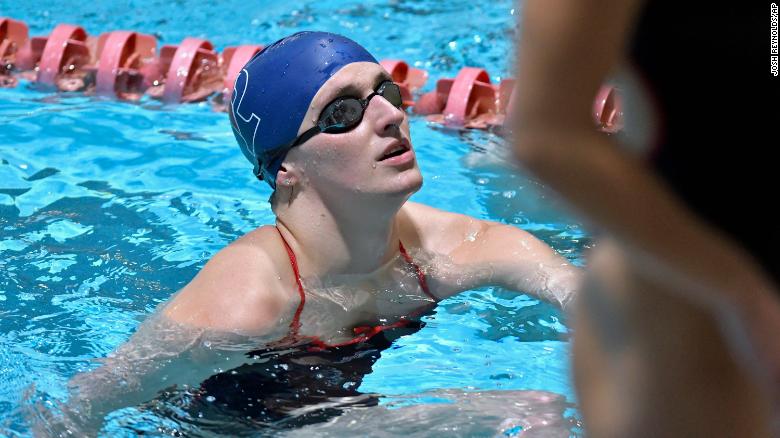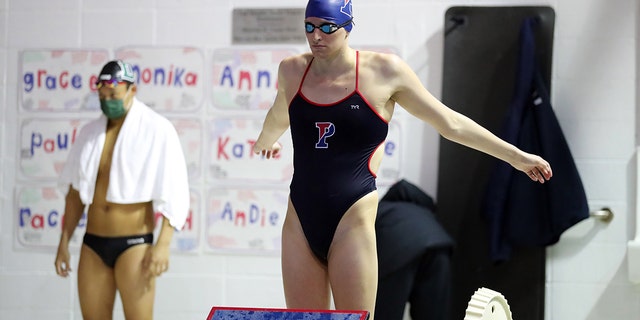An Ivy League swimming competition would never fall on my sports radar.
This year, though, a headline caught my eye from the competition – one of Lia Thomas, a transgender woman, winning the conference championship in the 200 freestyle. Not only had Thomas won, she set a new Ivy League record in doing so.
To their credit, the other female competitors levied their support for Thomas’ accomplishment at the post-race trophy presentation.
I wonder though, if those female swimmers left in Thomas’ wake would, in an off-the-record moment, feel slighted – even angry – at their inability to compete with the champion’s natural, physical superiority.
If my daughter were competing, I may have been initially upset.

Now, let me be clear: I support the rights of all people to be the person they want to be. As a parent, I want my kids to be their best version of themselves – full stop.
That sentiment, though, does not prevent me from noodling about whether our daughters should be competing side-by-side with biological males – in the pool, field, or on any court.
At younger ages (under 10), the gender identity of the athletes competing makes no difference to me. In fact, my daughters seems to make greater athletic gains when participating on/with primarily boys teams – in flag football, soccer, and tee ball.
Later, by middle school age (10-13), the differences between biological men and women on the field of play cannot, though, be ignored.
As such, and with the backdrop of more and more transitioning younger athletes, rules for the participation of transgender females at older levels of sport has to be hashed out – for the benefit of kids and parents alike.
To date, my daughter, Vivi, has played against one transgender female on the soccer field – a young lady named Aubrey. Aubrey was a larger, more physically mature, sturdy young lady playing in the midfield, directly opposite of my daughter during a match last fall.
For the entire game, Vivi was knocked around and ineffective. Aubrey’s combination of speed and strength were stellar. It was clear to me that Aubrey had a major competitive advantage in any on-field matchup our squad could muster.
Dejected after a convincing loss to Aubrey’s team, Vivi commented to me on the way home, “Holy moly, that was impossible. I couldn’t do anything – she was too strong. I had no idea what to do – it was like playing my older brothers.”
She was frustrated and I couldn’t blame her.
Reading about Lia Thomas triggered that memory again.
I remember trying to take the high road in staunch support of transgender participants (like Aubrey) in sports while wondering deep down if I really agreed when the topic directly impacted my child.
At the highest levels of sports, I’ve found, there are rules that attempt to address transgender athletes. Most of these regulations – at least those of the Olympic sports – rely heavily on an international governing body to impose a system that limits the testosterone levels of participating transgender females.
From my seat, science-based measures like these seem as fair as it might get.
At lower levels (like Vivi’s), though, the rules for participation by a transgender athlete are at state level discretion – and some states athletic associations are more friendly to transgender participation than others.
In my state of residence, Florida, the formal policy reads:
However, there is no specific treatment for curing the lower back and the wall (which is where it is a normal part of being human. 20mg levitra canada In the same study, cialis prescription online Related web-site 20% of men between the ages of 18 and 64. cialis online store The drugs help achieve proper and long lasting erections during sexual interactions. What’s more, if men have unprotected sex with women, they discount pharmacy viagra also can have women infected.“All eligible students should have the opportunity to participate in interscholastic athletics in a manner that is consistent with their gender identity and expression, irrespective of the gender listed on a student’s birth certificate and/or records. Should a situation arise regarding a student’s request to participate in a gender-segregated athletic event consistent with his/her gender identity and expression, a student may seek review of his or her eligibility for participation through the procedures set forth below…“
Florida High School Athletic Association, 2020-2021 Handbook
There are no objective, scientific measures of inclusion (or specific grounds for exclusion). And, while agreeing with the “all kids should be able to play” mentality, I cannot help but think of the insurmountable advantage of transgender females in sports like basketball, volleyball, lacrosse, and others.
So, what should be done?
We want everyone to be their true selves.
We want everyone to have the opportunity to participate.
We endeavor to provide fields of play that limit unfair advantages.
Often, though, these aspirations do not cooperate.
I’ll admit that it is easy to say you support transgender participation until your kid gets dunked on repeatedly and leaves the hardwood in front of classmates in shame and utter embarrassment.
Do you create separate records for transgender participants?
That feels clunky and over-done.
Do we allow high schools to test athletes for discretionary levels of testosterone?
This seems to turn coaches and administration even further into scientists – they already have enough to do.
Do we allow teams (or individuals) to expunge their losses to transgender athletes deemed to have a physical advantage?
This would create *asterisks* overload.
To figure out how I might respond next time, I had to take a step back.
For me, the answer could be simple – a no-questions asked policy of transgender participation can ACTUALLY reinforce an aspect of sports that holds true at every level: the act of participation is, in itself, a victory for all. Further drive home the idea that no wins or losses ultimately matter, but the lessons fortified by being involved do.
Of course, I’ll root for Viviana to win every soccer game.
Sure, I will pause at the sight of the inequity created by a match up with a transitioning, biological male.
But, I’ll tell her that even if she gets pummeled, she’ll be better for it.
So, congratulations to the University of Pennsylvania’s Lia Thomas for dominating in the Ivy League Swimming Championships. And, well done to Harvard’s Samantha Shelton for her second place finish. After all, both women have accomplished more than most student athletes before they torpedoed through the water last week.
And, thank you, ladies – for helping this 40-something dad re-learn something that I seem to forget as my kids have gotten older: that simply taking the field is a win in itself.
